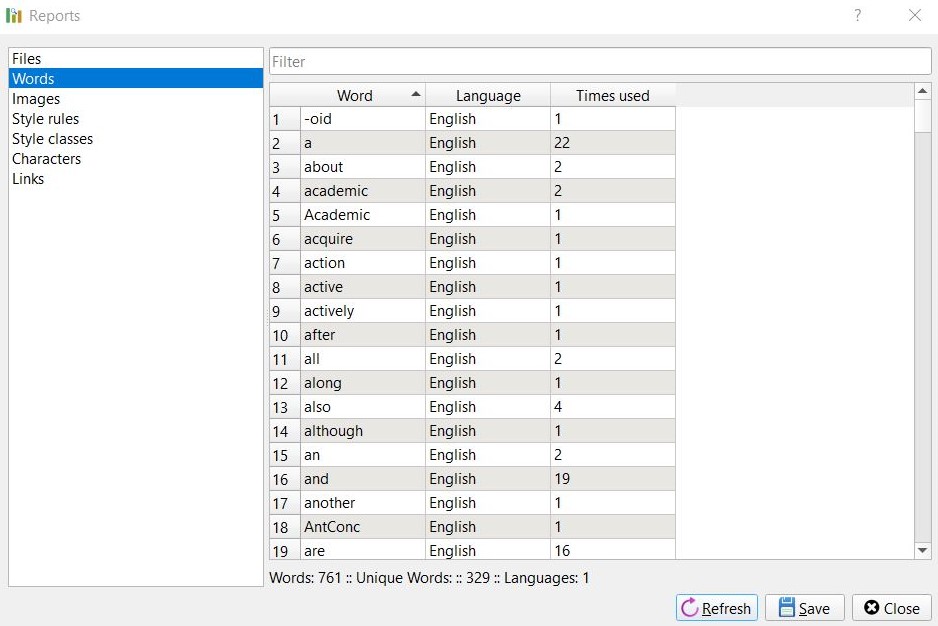Practical ways to expand your Vocabulary for academic writing
Academic writing is exact writing, and exact writing requires that you use the exact word. Consider the distinction between ‘mass’ and ‘weight’; between a ‘typeface’ and a ‘font’; or a ‘spider’ and an ‘insect’. However, academic writing is not only about technical words or jargon but many other words that help you to convey your thoughts. How do you learn those words? How do you expand your vocabulary? This article provides some practical ways to do so.
1. Read widely to assimilate the word
One of the most effective ways to learn new words is to read widely so that you are exposed to words used in many different fields. This is effective because you learn words in their context – you see them ‘in action’, being used in the ways they are meant to be used. When you have encountered a word half a dozen times, you soon get a pretty good idea of what it means and how it is used.
More importantly, by assimilating the word, you are making it part of your idiolect, which means a ‘person’s individual way of speaking or writing a language’.
2. Look up more than the meaning in a dictionary
When you do look up a word in a dictionary, don’t just look up the meaning but also find out how the word is derived, because it will help you not only to remember the word better but also to guess the meaning of other as yet unfamiliar words derived from the same source.
For instance, consider the suffix ‘-oid’. Once you know that it means ‘resembling’ or ‘like’, you can guess that a humanoid is something (perhaps a robot or an extra-terrestrial) that is like a human being but not quite one. As another example, learn how ‘e.g.’ and ‘i.e.’ are derived and used in this article.
3. But don’t look up every unfamiliar word
You should acquire new words as you go along and not hunt for them actively. Research shows that for such active learning, you should know about 95% of the words you encounter on a page. Reading is no longer enjoyable or even worthwhile if more than 10% of the words on the page are unfamiliar to you, and if you know more than 98%, you are unlikely to be expanding your vocabulary.
4. Consider using graded readers
If English grammar and vocabulary are major obstacles for you, you should explore graded readers, which use deliberately controlled vocabulary and sentence constructions to ensure that the books are at the right level of difficulty for their target readers.
5. Supplement reading with listening
Audiobooks, podcasts and many online resources are a great help because when you encounter new words by hearing them, you also learn how they are pronounced. This can help you to remember them better because you are using yet another part of your brain that deals with language.
Tip: If possible, read the transcript of the talk you are listening to – not while you are listening but either before or after.
6. Practise using your new vocabulary as often as possible
Merely memorising lists of difficult or unusual words is unproductive, because you do not really assimilate those words. Instead, try to practise using them in everyday conversation. Or, if the words are too technical or specific to your discipline, and not suitable for casual conversation, practise incorporating those words or terms in your writing.
7. Check your progress – with a concordance tool
Finally, check your progress to see whether you are using the new words you have assimilated over time. You can do this by using a concordance tool, a software utility that compiles a list of all the words that occur in a file. A few such tools are Calibre, AntConc and TextSTAT.

Pool all your writings over the past few months into a single file and run the utility. Select the option to sort the words in the document in ascending order of their frequency and to ignore words with three or fewer letters. This way, the less common words will be at the top, and you can see for yourself some evidence of your growing vocabulary.
In conclusion
Improving your vocabulary helps you use the right word, which conveys that you understand and are familiar with the correct and conventional language of a particular discipline. Think of it as a badge.
Maximise your publication success with Charlesworth Author Services.
Charlesworth Author Services, a trusted brand supporting the world’s leading academic publishers, institutions and authors since 1928.
To know more about our services, visit: Our Services